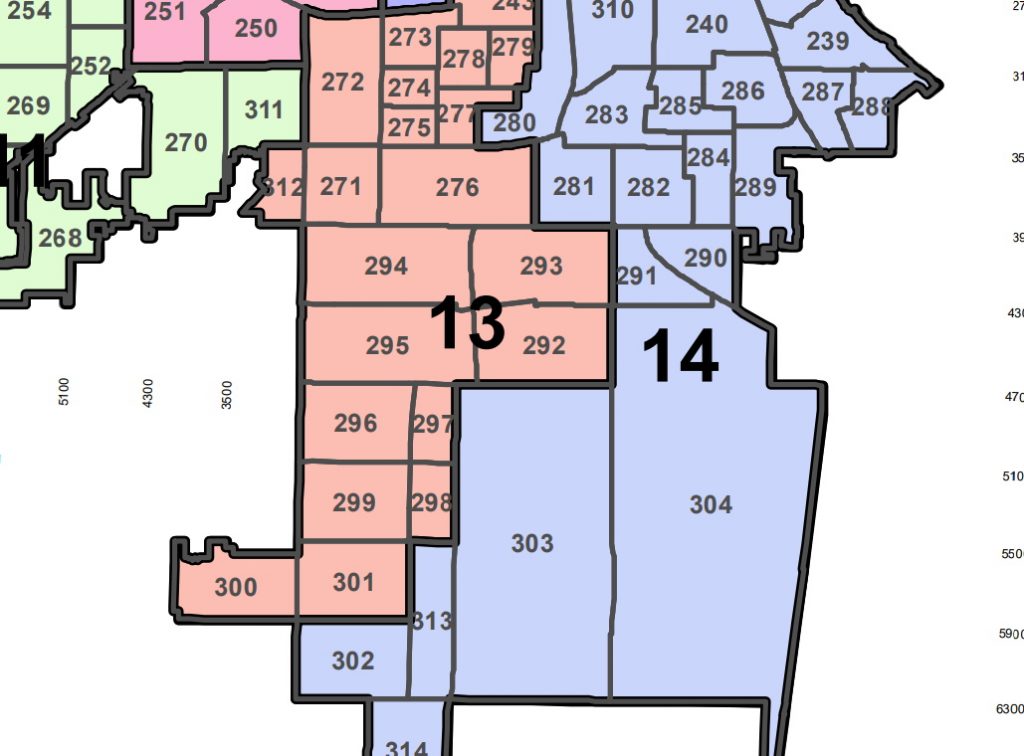Latino Leaders Could Sue Over Redistricting
They demand council hire outside counsel. City Attorney defends his closed-door advice.
After a three-hour, closed-session discussion between the Common Council and the City Attorney’s Office resulted in a council committee rejecting any changes to the configuration of the 15 council districts, a coalition of Latino leaders is threatening to sue the city.
At issue is a potential third Hispanic majority council district. The voting-age Hispanic population now represents 17.6% of all city residents. But the location of those residents and the stated desire of council members and Latino leaders to avoid diluting the existing two majority Hispanic districts has made it a challenge to create the third district.
In public comments during Monday’s six-hour meeting, assistant city attorney Kathryn Block suggested the council and Latino stakeholders were creating a record that proposed changes were only being made because of race and such an action might not survive a legal challenge given the lack of an underlying Voting Rights Act violation in the original proposal. The committee, after meeting in closed session to receive more advice, decided not to act on any of six new map proposals and recommended readopting its original map again.
“We are exploring taking legal action because we believe both the outcome and the process is a violation of Latinx voting rights and the larger goal of civil rights,” said Christine Neumann-Ortiz, executive director of immigrant rights organization Voces de la Frontera, during a press conference Friday morning. “The map which the City Attorney erroneously told committee members they had to adopt splits the far south-side Latinx community in half despite ample evidence that a new third majority or near majority Latinx aldermanic district can easily be created and holds up to redistricting standards.”
The coalition is now requesting that the council pay an outside attorney to render a second legal opinion.
“The explicit purpose of this counsel should be to review not just Monday’s opinion by the City Attorney, but all advice provided to the Common Council from the City Attorney’s office as well as to provide expert legal guidance moving forward in the process,” said Forward Latino president Darryl Morin. “Failure to retain outside counsel with this expertise would not just be an affront to Dr. Martin Luther King Jr. who we are set to commemorate in three days, it would not just unlawfully diminish the vote of communities that have been traditionally underserved and discriminated against, but it would also be an invitation for these communities to bring about time-consuming and costly litigation.”
In November the Common Council thought it had concluded its decennial redistricting process. Making relatively minor adjustments to accommodate areas of the city where the population grew or shrank, it adopted a new map that maintained the balance of six Black majority districts, two Hispanic districts and five white districts. Two of the white districts were defined as Hispanic “influence” districts with a Hispanic voting-age population of at least 25%. The remaining two districts had no racial or ethnic majority.
But the coalition was successful in getting then-Mayor Tom Barrett to veto the proposal and the council agreed to take another look.
In a statement issued Friday afternoon, City Attorney Tearman Spencer defended his office’s work.
“I am not at liberty to speak freely regarding advice provided to our clients, but let me assure anyone interested in knowing that all legal analysis and advice provided by this office is generated by highly capable attorneys,” wrote Spencer. He directed anyone interested to review the public opinion created for Alderman Scott Spiker on Jan. 9.
Spencer, who has become an embattled figure at City Hall, did not speak publicly during Monday’s meeting. Any council references to advice rendered referred to comments of assistant and deputy city attorneys, but Spencer did appear on the list of virtual attendees of the meeting.
Spiker, whose district could be dramatically reconfigured to create a third Hispanic district, requested the opinion, he said, because of concerns of another minority community in his district.
Though it was referred to by many speakers as a Muslim community, it isn’t eligible for protection under the Voting Rights Act because of its religious status, but by virtue of its racial makeup. The population is made up of a number of minority groups, best summarized as MENA (Middle East and North Africa). It also includes a growing Indian subcontinent population. The federal census, originally proposed by the Obama administration to include a MENA identity option, ultimately was conducted without the option under the Trump administration. The result is that there is no clear data on exactly how many area residents are part of the minority population base, but a review of area business names suggests it’s a sizable population.
If maps proposed by Voces and others were adopted, Palestinian immigrant and real estate developer Nabil Salous said members of his community could pursue legal action because they believe their community was being split up. He was supported by a number of other speakers on Monday.
Voces used American Community Survey data to argue that the division wasn’t taking place, but others disputed the quality of the data and Salous singled out a new complex he was developing at 800 W. Layton Ave. as an example of a primarily Muslim complex that would be impacted.
The full council is scheduled to take up the matter on Jan. 18. But on Friday, the Latino coalition delivered an open letter with dozens of signatories to the council that requested the council seek the second legal opinion.
“Achieving equal representation and being able to cast equal and effective votes depends on those maps that are drawn fairly to reflect and respect all of our communities,” said Hispanic Collaborative president Nancy Hernandez. “That’s at the core of why we’re here. That’s why we’re not just taking what the City Attorney’s opinion is as fact, that’s why we’ve engaged other expert council on this issue. That’s why we feel firmly that the city of Milwaukee and the Common Council needs to look at disinterested, nationally recognized outside experts to advise on this.”
The new map, when it’s finally determined, would first be used for the 2024 council election.
For more detailed coverage of Monday’s meeting, see our coverage published that night.
Maps and Statistics
- Map E
- Map D
- Map C
- Map B
- Maps B, C, D and E Descriptions
- Barrett Veto Letter
- Voces-Petering Map Options
- Voces Original Concept Map
- Adopted District Map – Detailed
- Adopted District Map – 11×17
- Adopted District Map Demographics
- Adopted 2021 City Ward Map
- 2012 Ward Map
- 2012 Common Council Districts
- 2000 to 2010 Population Change by Aldermanic District
- 2010 to 2020 Population Change by Aldermanic District
- 2020 Population Change by Wards
- 2020 Aldermanic District Demographics
If you think stories like this are important, become a member of Urban Milwaukee and help support real, independent journalism. Plus you get some cool added benefits.
More about the Milwaukee County redistricting process
- Op Ed: Muslim Community Needs Representation - Janan Najeeb - Jan 29th, 2022
- City Hall: Council Ends Redistricting With Anger, Tears - Jeramey Jannene - Jan 18th, 2022
- Statement from Milwaukee Mayor Cavalier Johnson - Mayor Cavalier Johnson - Jan 18th, 2022
- City Hall: Latino Leaders Could Sue Over Redistricting - Jeramey Jannene - Jan 14th, 2022
- Latinx Leaders Condemn Common Council’s Refusal to Draw New Districts Reflecting Dramatic Growth of Latinx Population; Demand Second Legal Opinion - Voces de la Frontera - Jan 14th, 2022
- Voces de la Frontera Statement on Redistricting Decision - Voces de la Frontera - Jan 11th, 2022
- Statement on redistricting decision - Ald. JoCasta Zamarripa - Jan 10th, 2022
- City Hall: Milwaukee Starts Over On Redistricting, Only To Adopt Same Map Again - Jeramey Jannene - Jan 10th, 2022
- Statement by Milwaukee Mayor Tom Barrett: - Mayor Tom Barrett - Dec 14th, 2021
- City Hall: Council Halts Redistricting After Latino Pushback - Jeramey Jannene - Dec 14th, 2021
Read more about Milwaukee County redistricting process here
Political Contributions Tracker
Displaying political contributions between people mentioned in this story. Learn more.
- February 5, 2016 - Tom Barrett received $100 from Nancy Hernandez
- August 29, 2015 - Tom Barrett received $100 from Nabil Salous
























